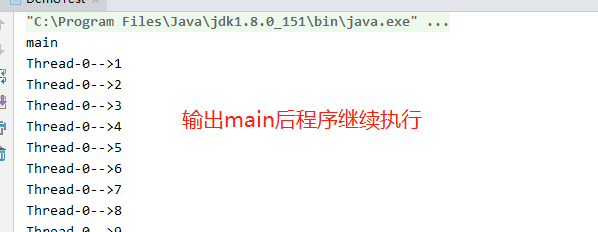The join() method in Thread is used to let the calling Thread wait for the current Thread to finish executing before executing
Test code:
Scenario 1: do not call join()
public static void main(String[] args) throws InterruptedException {
Thread t1 = new Thread(){
@Override
public void run() {
for(int i = 1 ; i <= 100 ; i++){
System.out.println(Thread.currentThread().getName()+"-->"+i);
}
}
};
Thread t2 = new Thread(){
@Override
public void run() {
for(int i = 1 ; i <= 100 ; i++){
System.out.println(Thread.currentThread().getName()+"-->"+i);
}
}
};
Thread t3 = new Thread(){
@Override
public void run() {
for(int i = 1 ; i <= 100 ; i++){
System.out.println(Thread.currentThread().getName()+"-->"+i);
}
}
};
t1.start();
t2.start();
t3.start();
//Output the name of main thread
System.out.println(Thread.currentThread().getName());
}
Test result: first, the name of main thread is output, then t1, t2 and t3 are output successively.

Scenario 2: calling join() to make main thread wait
public static void main(String[] args) throws InterruptedException {
Thread t1 = new Thread(){
@Override
public void run() {
for(int i = 1 ; i <= 100 ; i++){
System.out.println(Thread.currentThread().getName()+"-->"+i);
}
}
};
Thread t2 = new Thread(){
@Override
public void run() {
for(int i = 1 ; i <= 100 ; i++){
System.out.println(Thread.currentThread().getName()+"-->"+i);
}
}
};
Thread t3 = new Thread(){
@Override
public void run() {
for(int i = 1 ; i <= 100 ; i++){
System.out.println(Thread.currentThread().getName()+"-->"+i);
}
}
};
t1.start();
t2.start();
t3.start();
t1.join();
t2.join();
t3.join();
//Output the name of main thread
System.out.println(Thread.currentThread().getName());
}When join() is called for t1, t2 and t3, t1, t2 and t3 will execute concurrently, but the main thread will always be in a blocking state and wait for t1, t2 and t3 threads to finish executing before executing.
